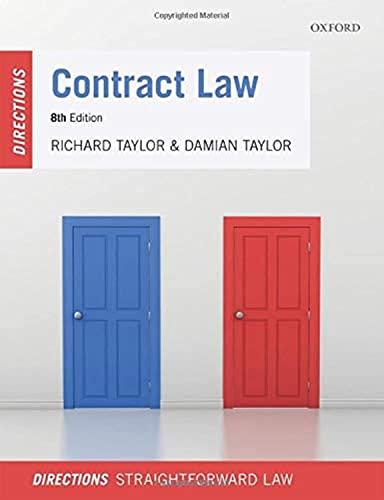Answered step by step
Verified Expert Solution
Question
1 Approved Answer
LEWIS KULA, Appellant, v. KARAT, INC., a Nevada Corporation, Respondent Supreme Court of Nevada February 26, 1975 The appellant and his companion, referred to in
LEWIS KULA, Appellant, v. KARAT, INC., a Nevada Corporation, Respondent Supreme Court of Nevada February 26, 1975 The appellant and his companion, referred to in the record only as Goldfinger, were guests in the respondent's Stardust Hotel in Las Vegas, Nevada. Appellant availed himself of the hotel's service for the safekeeping of valuables and money and deposited $ 18,300 with a cashier in the casino. This deposit was made solely in appellant's name, he was given a receipt for the amount of the deposit and advised that he might withdraw funds from the cashier by signing for them, and that the money could be withdrawn only upon his signature. During the next two days appellant and Goldfinger gambled in the respondent's casino. There was testimony that they gambled from the same funds and freely exchanged chips to make bets. During that period, appellant made withdrawal as well as deposit transactions with the cashier. On the evening of June 7, 1969, there was $18,000 on deposit with the cashier before Goldfinger lost $500, and was without funds to cover the loss. He asked Philip Ponto, respondent's shift boss, to telephone appellant for a guarantee of the loss. Ponto called appellant. The text of that telephone conversation is in dispute. Appellant testified that he authorized Ponto to give Goldfinger credit to the extent of $ 1,000, but no more. Ponto's testimony confirms the $ 1,000 authorization, and relates that he specifically asked appellant if Goldfinger could gamble against the entire safekeeping deposit, and received an affirmative response. In any event, Goldfinger was permitted to gamble with chips procured by signing "markers" totaling $ 18,000. When Goldfinger stopped gambling the shift boss requested the safekeeping receipt which he needed to send to the cashier's cage with the "markers." It is alleged that Goldfinger agreed to go to the room and get it, but instead he disappeared. That morning appellant went to the cashier's cage and made a demand for the $18,000. When informed of the actual credit extended to Goldfinger, he acknowledged the $1,000 authorization and demanded $17,000, which is the amount prayed for in his complaint. [Legal Rules] The trial court properly found a bailment had been created by the deposit of the money with respondent. [A bailment is when one person gives property to another person for safekeeping] A bailment of money is as well recognized as the bailment of any other personal property. [Application of the rules to the facts]Appellant and a witness for respondent both testified that the money could only be withdrawn upon appellant's signature. Appellant steadfastly maintained that the money in safekeeping belonged only to him. Respondent accepted deposits and authorized withdrawals from the safekeeping fund only upon appellant's initials. It recognized ownership in him and refused to allow Goldfinger credit against the fund until approval was obtained from appellant. This evidence of ownership in appellant is not overcome by the testimony from one witness for the respondent that "[H]e [Kula] said he only owned half of it," nor by the fact that appellant and Goldfinger had both made bets from money previously withdrawn from the deposit in safekeeping. Appellant's sharing of chips with Goldfinger is not sufficient to show joint ownership over a deposit of money held by the respondent under a bailment contract made only in appellant's name and subject to withdrawals only upon his signature. Here the $18,000 was never delivered to Goldfinger but retained by respondent as its own upon the ground that appellant had orally authorized respondent, through its employees, to permit Goldfinger to gamble against the deposit. [More Rules] Where a bailee [the one who receives the property], either for hire [fee] or gratuitously [free], is entrusted with care and custody of goods, it becomes his duty at the end of the bailment to return the goods or show that their loss occurred without negligence on his part. Failing in this, there arises a presumption that the goods have been converted [stolen] by him, or lost as a result of his negligence, and he is accountable to the owner for them. [Conclusion] Appellant is entitled to recover the $17,000 which was converted. [Order] This matter is reversed and remanded with instructions to enter a judgment in favor of appellant not inconsistent with this opinion. [In other words, Judge Mendoza was wrong, so now he can try again]. Questions 1. What is the legal basis of the lawsuit (what is the legal rule that was broken)? 2. Do you believe Ponto or Kula? Why? 3. Why doesn't the casino sue Goldfinger? 4. If you owned the casino, would you give him the 18K after this decision or keep fighting it? Or put him in a barrel and throw him into Lake Mead
Step by Step Solution
There are 3 Steps involved in it
Step: 1

Get Instant Access to Expert-Tailored Solutions
See step-by-step solutions with expert insights and AI powered tools for academic success
Step: 2

Step: 3

Ace Your Homework with AI
Get the answers you need in no time with our AI-driven, step-by-step assistance
Get Started


